Can you trust everything YOU read? The Bible and Christian ethics
 Tuesday, April 26, 2016 at 9:16AM
Tuesday, April 26, 2016 at 9:16AM  Tuesday, April 26, 2016 at 9:16AM
Tuesday, April 26, 2016 at 9:16AM  Thursday, April 21, 2016 at 8:41AM
Thursday, April 21, 2016 at 8:41AM  Thursday, April 14, 2016 at 7:17PM
Thursday, April 14, 2016 at 7:17PM Prof Jean Pierre Wils delivered a paper at a biomedical ethics conference at Stellenbosch University in August last year (if I recall correctly). He made a deeply challenging and thought provoking point that contemporary ethics seems obsessed with just health care, but the more important ethical issue is just health. Simply stated, unjust societies contribute to illness among their populations. This is not just a matter of providing adequate health care, it is a larger issue, it has to do with gender, economics, access to a healthy diet, sexual and reproductive rights etc.
I was asked to write a paper in response to his paper - which I have done and it is currently under review for a special edition of the journal 'In luce verbi' in which his paper and mine will appear. I will let you know when they are published.
In the meantime I discuss the issue of just health care and the South African biomedical theological ethical context in this video entitle 'Detrimental to your health'. I'd love to hear your insights, thoughts and comments!
 Thursday, April 14, 2016 at 7:05PM
Thursday, April 14, 2016 at 7:05PM Is Stellenbosch really the most unequal city in the world?
Today I rode my Brompton through Stellenbosch - I had 25 minutes between meetings and wanted to get something for lunch. It was the first time I had been on the bike in more than a week. I came back form Johannesburg with a rather nasty flu and still wasn't feeling great. But it was awesome to be out in the sun and enjoying the fresh air and beautiful western Cape scenery!
As I was riding my bike I reflected on Stellenbosch, which is the most unequal city in South Africa (a country which is among the most economically unequal countries in the world).
Watch the VLOG for some beautiful scenery, and think with me about a better economic system in which no one has too much while anyone has too little.
I’d love to hear your feedback and thoughts! Don’t you love my old folding bike? It goes with me when I travel.
 Monday, February 29, 2016 at 7:41PM
Monday, February 29, 2016 at 7:41PM Professor Heinrich Bedford-Strohm, the presiding bishop of the Evangelical (Lutheran) Church in Germany, and a close friend of the late Prof Steve de Gruchy, will give the Steve de Gruchy Memorial Lecture, on Tuesday 1st March 2016 at 19:00 at the Rondebosch United Church, Belmont Road, Cape Town. He will speak on the refugee crisis in Europe and the situation in the Middle East.
This is an open invitation to anyone who may be interested in attending. Prof John de Gruchy will also say a few words.
I hope to see you there!
 Friday, January 1, 2016 at 12:35PM
Friday, January 1, 2016 at 12:35PM 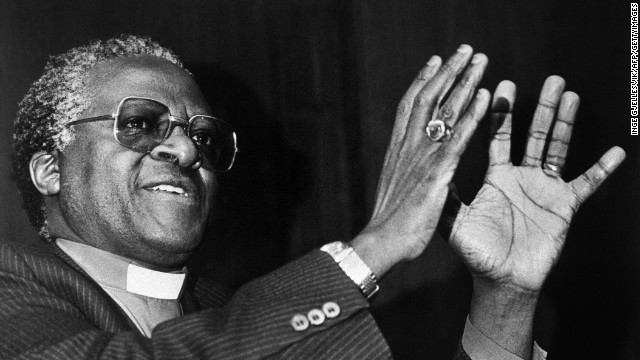 It is a new year. Of course nothing is different from yesterday. However, there is something special about a marker in time, a change of dates; it allows one to reflect, to take stock and to resolve to live more intently, perhaps even differently, beyond that point.
It is a new year. Of course nothing is different from yesterday. However, there is something special about a marker in time, a change of dates; it allows one to reflect, to take stock and to resolve to live more intently, perhaps even differently, beyond that point.
We ushered in the new year with friends. We talked, laughed, prayed, and even argued. I guess that there was hardly a gathering in South Africa that didn't have some conversation about the challenges we face in South Africa - many of which were exposed in 2015. We remain economically unequal. We remain divided by race and class. We remain suspicious and fearful of one another. We long for change.
I said to my family and friends that my commitment in the year ahead would be to work more ardently for the common good of all South Africans, and for South Africa. I am inspired by the following quote from Desmond Tutu's sermon at the funeral service of slain anti-Apartheid activist Steve Biko in 1977:
We are experiencing the birth pangs of a new South Africa, a free South Africa, where all of us, Black and White together, will walk tall, where all of us, Black and White together, will hold hands as we stride forth on the Freedom March to usher in the new South Africa where people will matter because they are human beings made in the image of God… for the sake of our children, Black and White together, let us dedicate ourselves anew to the struggle for the liberation of our beloved land, South Africa. Let us all, Black and White together, not be filled with despondency and despair. Let us Blacks not be filled with hatred and bitterness. For all of us, Black and White together, shall overcome, nay, indeed have already overcome.
- Desmond Tutu (at the funeral of Steve Biko in 1977).
The task may be challenging and complex. It will require courage, sacrifice, perhaps even robust engagement, and above all grace and love. But just because it is complex we must not, and should not, shy away from doing what we can do. We should find ways to address what we can see needs to be done. We must move from a modality of blame to a modality of working together for the common good.
Rich blessing to you and your family, your community and our people and land in 2016. May the end of 2016 show that we have laboured well and achieved much.
Hope is hearing the melody of the future. Faith is to dance to it.
- Rubem A. Alves (Brazilian educator and liberation theologian).
 Tuesday, October 6, 2015 at 9:43PM
Tuesday, October 6, 2015 at 9:43PM 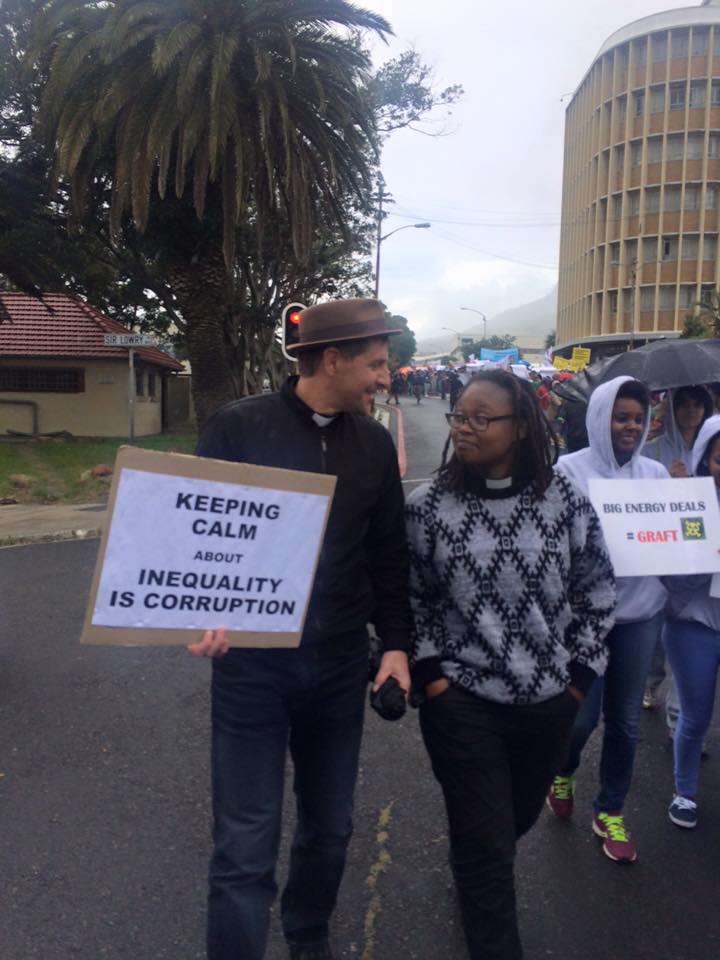 A week ago (30 September 2015) thousands of Christians gathered in cities across South Africa to show their discontent with increasing corruption in government and business in South Africa. It was beautiful to see women and men from a wide variety of denominations and theological traditions uniting to show that they are not afraid to act against persons who use prominence or power in politics or economics for personal and unjust gains. I was pleased to participate in the gathering in Cape Town, and know of friends who participated in Durban and Johannesburg gatherings.
A week ago (30 September 2015) thousands of Christians gathered in cities across South Africa to show their discontent with increasing corruption in government and business in South Africa. It was beautiful to see women and men from a wide variety of denominations and theological traditions uniting to show that they are not afraid to act against persons who use prominence or power in politics or economics for personal and unjust gains. I was pleased to participate in the gathering in Cape Town, and know of friends who participated in Durban and Johannesburg gatherings.
Of course there are various forms of corruption - persons who pay bribes, and persons who solicit them, so that deals can be done. These drive up the costs of products and services, meaning that less can be done for the common good. Fewer schools can be built, fewer hospitals staffed, fewer meals dispensed, fewer persons brought to justice, fewer crimes are solved, fewer communities are safe, and it is the poor and the powerless who suffer first, and who suffer most.
Someone asked me whether marches like this matter. Of course on some level they don't. In truth, nobody will admit to being 'for corruption', even the most corrupt have a public rhetoric against corruption - it is what they need to retain the trust and inactivity of those who allow them to remain in office, or conduct corrupt business.
On the other hand events like this are of critical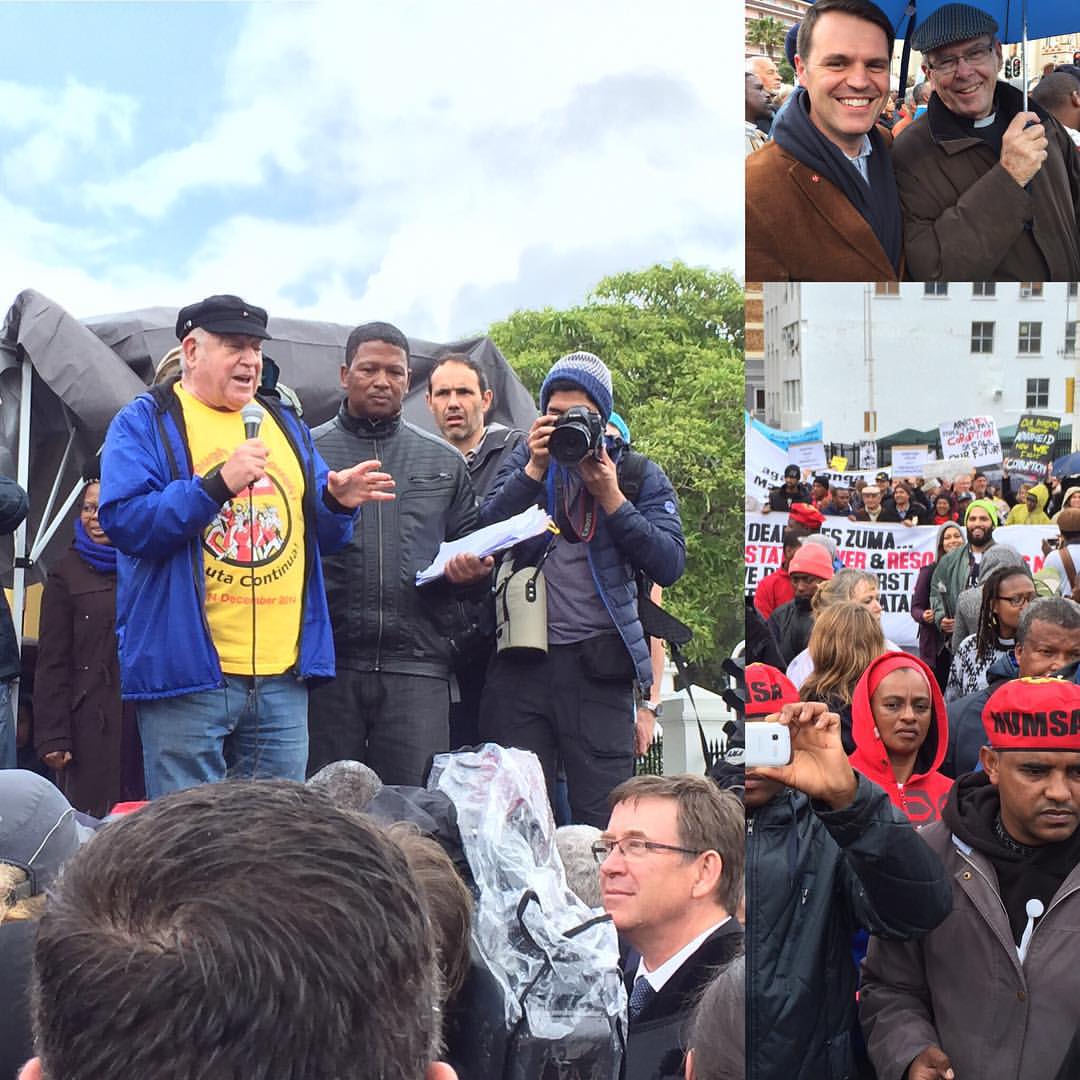 importance. They matter because we cannot be silent in the midst of injustice. Events such as these matter because we are showing that more and more sectors of South African society are impatient with the injustices and inequalities that are upheld by corrupt persons and corrupt practices. Events such as these matter because they show that we have a moral conscience, and that people from different religious groupings, and different traditions, can stand together. They matter because they show that we are not powerless or voiceless. They matter because they show that we are citizens who are engaged.
importance. They matter because we cannot be silent in the midst of injustice. Events such as these matter because we are showing that more and more sectors of South African society are impatient with the injustices and inequalities that are upheld by corrupt persons and corrupt practices. Events such as these matter because they show that we have a moral conscience, and that people from different religious groupings, and different traditions, can stand together. They matter because they show that we are not powerless or voiceless. They matter because they show that we are citizens who are engaged.
So, I would encourage you to act. Recognise that you have a right, even a responsibility, to speak out when things are wrong. Call those who abuse their office or position in business for unjust means to account. Remind elected officials that they are civil servants of the people, not civil masters. Remind businesses and business people that we, the consumers, are the ones who hold the wealth that allows them to operate, and if they will not do so for the common good we can exercise our right to choose someone or something else.
If you are a follower of Jesus it is important to remember that submission to his Lordship has political, economic and social consequences. What we believe must change how we live - and it should always be for the common good. This is the way of the servant King. As Stanley Hauerwas reminds us, the church does not have a social ethic, it is a social ethic - we are to become what we believe, our story, our witness, our worship, is to reflect what we believe and what we hope for.
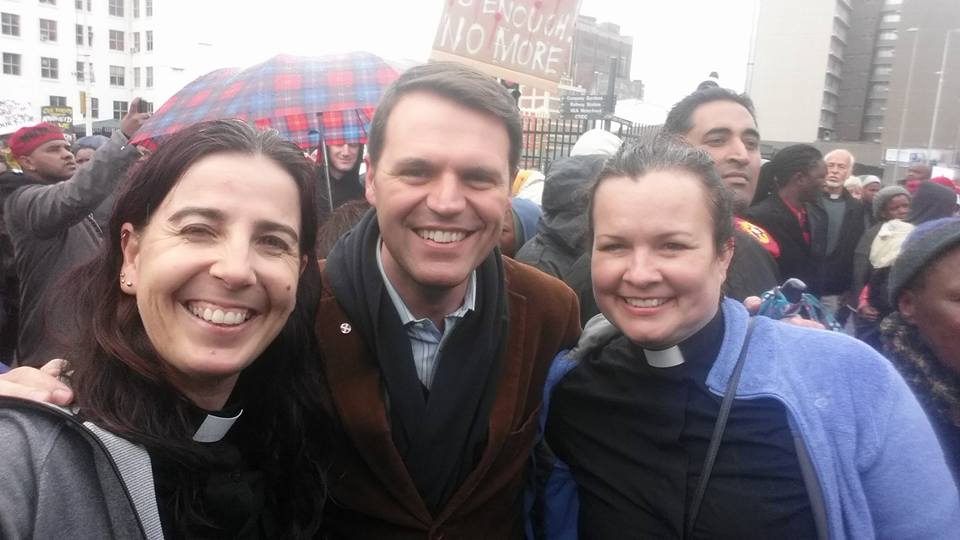
I would like to invite you to visit the Churches United Against Corruption website, or consider joining the campaign Unashamedly Ethical.
 Monday, July 27, 2015 at 8:38AM
Monday, July 27, 2015 at 8:38AM In a few hours I will be boarding a bus from the Heygensgebouw just near my flat, it will take me to Nijmegen station from where I will catch a train to Schipol airport and then head back to Cape Town via Dubai.
I have had the privilege of spending another month in the beautiful city of Nijmegen working on my PhD research. I am pleased to say that I can see the light at the end of the tunnel with this project! I have a meeting with my supervisor this morning, and if all goes as planned I will have some corrections on the work I have handed in already, and then just one more chapter to write before I work through my whole thesis again and hand it in for examination.
The process from there is that it goes to a 'reading team' who evaluate the research, if it is approved I have to have it published in a book, and then come back in 2016 for a public defence and the award of the degree.
It is a little different from how the process worked with my first PhD (which I completed in 2005, defended and graduated with in 2006). That seems like a lifetime ago!
This project focuses on the reading of the Biblical text under certain conditions (called intergroup contact theory) to facilitate engagement and reconciliation between racially diverse Christian groups in South Africa. I was privileged to work with two Methodist Churches in my home town, Somerset West on the intercultural Bible reading project.
The theoretical components of the research focussed on a normative reading of Matthew 18.15-35 (locating a reading of the text within accepted academic Biblical scholarship, so I did a very detailed exegetical study of the passage). Then, using an integrative All Quadrants All Levels (AQAL) approach I 'mapped' possible readings of the text as an individual, collective, spiritual, political process (and a combination of these fields). This exercise showed that Matthew 18 has a complex and textured view of forgiveness that involves faith (spirituality, belief, shared belief), polis / politics (recompense, social justice, human rights and dignity), and that it engages the individual person, as well as broader society. Here is a diagram of Ken Wilber's AQAL theory that shows the different dimensions of identity, consciousness and meaning.
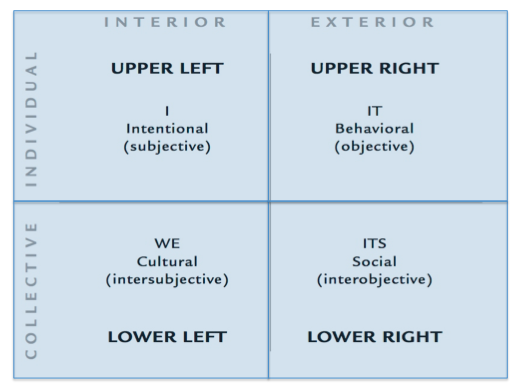
Next, I used a practice orientated research methodology to facilitate structured interviews with the reading group participants (this was to form a pre-intervention test of their understanding of forgiveness in relation to the chosen text). I mapped their various understandings and saw that in large measure white South Africans have an individual and spiritual understanding of forgiveness, whereas black / brown South Africans have a more collective and social (political) understanding of forgiveness. Each of the two Church groups then met separately to read the text and discuss it among themselves in a focus group setting - this also formed part of the pre-intervention testing and gave me more data to map the respective groups' understandings of forgiveness.
Then, I facilitated a series of intercultural Bible reading engagements between the two groups, again in a focus group setting (in other words they met together to read and discuss the text). We used the 'dwelling in the word' approach of Pat Keifert and Pat Taylor Ellison, see: Ellison, P.T. & Keifert, P. 2011. Dwelling in the word: a pocket handbook. Minnesota: Church innovations).
These intercultural Bible reading sessions were conducted according to strict protocols, employing mechanisms from intergroup contact theory to allow for a positive engagement between the participants that takes place within a safe space. The intention was to minimize anxiety in the presence of 'the other' and to allow for an increased possibility for empathy for the person(s) and position(s) of 'the other'.
Having completed those interventions, we then did a final post-intervention test to see if there has been any shifts in the understanding of forgiveness among the individual participants and the two groups. This was done through a structured questionnaire on forgiveness, as well as a focus group discussion (both of these tools engaged understandings of forgiveness, as well as the intercultural Bible reading process).
The findings have been quite remarkable. I won't let the cat out of the bag yet, but I can say that some aspects of my hypothesis were proven, while other deviated from the expecation in some aspects, and other still did not turn out at all as I anticipated. It makes for fascinating reading!
The hope is to provide two things out of this research, first an approach to using normative texts (in this case the Biblical text) as a reflective surface, and an engagement space, for intergroup contact among estranged or diverse groups. Second, the mechanisms employed in the intergroup contact will be of use to Churches, businesses, and other communities that face challenges as a result of race, class, religious, gender or other distinctives - it allows for a positive engagement between 'in groups' and 'out groups' in a manner which can foster social cohesion, overcome prejudice and can facilitate positive engagement among the groups.
I have worked very hard on this project! It took quite effort to get back into the exceptionally technical work of dealing with a Biblical text in an academically appropriate manner - I had to dust off my old Greek exegetical skills, learn a whole lot of things about the culture and context of the Matthean community into which the text was written, and then develop a hermeneutic bridge (in the form of the AQAL theory) that could help us to see what contemporary understandings of the text may be appropriate.
The project also forced me to learn a great deal about empirical research methodologies, and particularly qualitative research methodologies (and the use of tools such as ATLAS.ti to do coding and interpretive work). The new theoretical knowledge that I have gained on the Biblical text, forgiveness as a concept and process, the social and identity dynamics of South African communities, and of course I have learnt a great deal more about AQAL integrative theory and how it can be applied in these contexts (which is quite different form how I used it in my previous study in identity and cognitive neuroscience). Among the most useful knowledge is what I have gained from reading and learning about intergroup contact theory and social identity theory. This is a fascinating field. I can see that I will use this, and my rekindled love for technical work in the Biblical text within my research in ethics and public theology.
For now, however, I have a few last meetings, some packing, and then the long trip home to my darlings! I can't wait to see them!
It has been great to have shared this time with friends, I have worked hard and learnt a great deal. It is such a privilige!
On Wednesday I step back into class when I will be teaching a Masters module in Ethics of Pastoral Care, as well as my fourth and second year classes in ethics and Systematic Theology.
 Tuesday, June 2, 2015 at 12:57PM
Tuesday, June 2, 2015 at 12:57PM 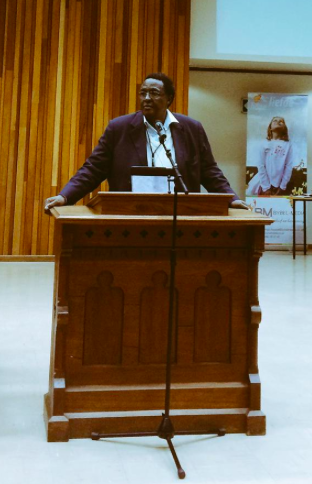 You can download Prof Barney Pityana's opening Keynote on Discipleship Active Citizenship which was delivered on 2 June 2015 at the Winter School of the Faculty of Theology at Stellenbosch University from this link [mp3 file, 50MB]
You can download Prof Barney Pityana's opening Keynote on Discipleship Active Citizenship which was delivered on 2 June 2015 at the Winter School of the Faculty of Theology at Stellenbosch University from this link [mp3 file, 50MB]
The Winter School is hosted by Ekklesia and the Beyers Naude Center for Public Theology in the first week of June each year. This year's theme is 'Changing the world? An invitation to faithful discipleship and responsible citizineship'.
I apologize for the poor sound quality of the recording. I recorded it using my cellphone and so there is some ambient and room noise in the recording. However, it is well worth the inconvenience to hear Prof Pityana's lecture.
I was deeply struck by a few comments that Prof Pityana made. Among them was the observation that the three most prominent public persons in SA at present (President Jacob Zuma, Chief justice Mogoeng Mogoeng and the leader of the official opposition, DA leader Musi Miamani) are all ordained pastors of independent Christian Churches. Prof Pityana discusses this phenomenon and asks some questions of the type of Christianity that is represented by these persons, and also how this reflects on us a nation.
I'd love to hear your comments, thoughts and feedback!
 Sunday, May 10, 2015 at 8:46PM
Sunday, May 10, 2015 at 8:46PM I am not quite sure what 'qualified' me to be invited to participate in the World Economic Forum on Africa that is to be held in Cape Town next month (3-5 June 2015)? However, I am grateful and a little nervous to attend!
I was sent an invitation once before (about a year ago), but was not able to take up the invitation at that time. I felt then, as I do now, that there were others who could serve better in that realm and so I suggested that they invite some other South African academics and business leaders that I have worked with. Sadly the invitation is not transferable. So I thought that was it!
But recently I received another invitation to next months meetings. After checking with my HOD and our Dean if I could be released to go (which they enthusiastically agreed upon!) I completed my registration and received a confirmation of attendance on the same day!
I am not entirely sure what the 3 day meeting will entail. However, I am excited to participate and look forward to learning and bringing a perspective on economics that is shaped by the common good, informed from the ethics of my Christian faith. I have done some work in recent years on economics and justice, written a book and a number of articles on issues such as poverty, inequality, corruption and suffering, but also on faith and work and the responsible purpose of wealth.
I would appreciate your prayers.
You can read about the meetings here:
http://www.weforum.org/events/world-economic-forum-africa-2015
I will post information and details here as I receive them.
 Wednesday, May 6, 2015 at 12:11PM
Wednesday, May 6, 2015 at 12:11PM I discovered today that an article I had written some time ago had been published and made available to the public from the Theological Journal, HTS.
The details for the article are:
Title: What hope is there for South Africa? A public theological reflection on the role of the church as a bearer of hope for the future
Please follow this link to download a copy from the Journal website: http://www.hts.org.za/index.php/HTS/article/view/2814
Abstract:
What hope is there for South Africa? What role can the church play as a bearer of hope in South Africa? This article seeks to address these important questions. Firstly, it problematises the contemporary notion of hope in South Africa by showing that it is a complex theological and social concept. Next, a nuanced understanding of hope is presented by adopting a public theological methodology that brings dominant theological perspectives on eschatological hope into dialogue with the most recent statistics about the quality of life in South Africa from 1994, 2004 and 2014. The article proposes that the complexity of Christian hope necessitates an understanding of the present reality that is held in dynamic tension with the desired future – namely a present-futurist eschatology. Finally the article shows that from this vantage point the church, in its various forms and understandings, is able to be a bearer of Christian hope that can contribute towards shaping a better future for South Africa.
Reference:
If you have a chance (and the stamina!) to read it I would appreciate feedback and comments. There is an itneresting set of statistical data on living conditions in South Africa.
 Tuesday, May 5, 2015 at 9:47AM
Tuesday, May 5, 2015 at 9:47AM 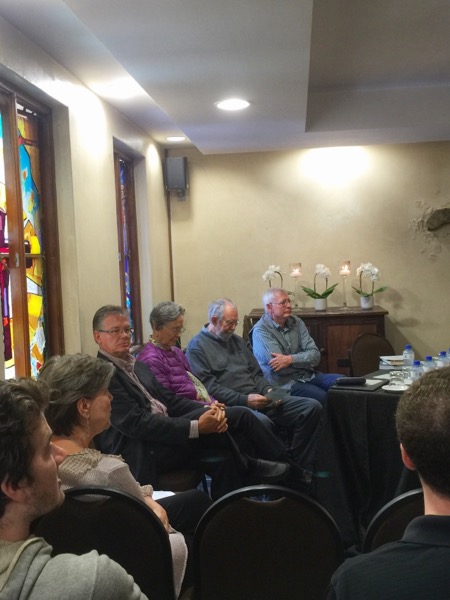
Today the Faculty of Theology at Stellenbosch University celebrates the 100th anniversary of Beyers Naude's life - a courageous witness to justice, reconciliation, hope and God's Kingdom on earth.
Pictured here (L-R) areDr Horst Kleinschmidt, Prof Denise Ackermann, Prof John de Gruchy, Dr Murray Coetzee who are all friends and researchers in the Beyers Naude Center.
The meeting was opened with a reading from Isaiah 32.1-8, and 15-20. A deep challenge for our current context.
Here is the text:
"See, a king will reign in righteousness
and rulers will rule with justice.
Each man will be like a shelter from the wind
and a refuge from the storm,
like streams of water in the desert
and the shadow of a great rock in a thirsty land.
Then the eyes of those who see will no longer be closed,
and the ears of those who hear will listen.
The mind of the rash will know and understand,
and the stammering tongue will be fluent and clear.
No longer will the fool be called noble
nor the scoundrel be highly respected.
For the fool speaks folly,
his mind is busy with evil:
He practices ungodliness
and spreads error concerning the Lord;
the hungry he leaves empty
and from the thirsty he withholds water.
The scoundrel’s methods are wicked,
he makes up evil schemes
to destroy the poor with lies,
even when the plea of the needy is just.
But the noble man makes noble plans,
and by noble deeds he stands." ...
"till the Spirit is poured upon us from on high,
and the desert becomes a fertile field,
and the fertile field seems like a forest.
Justice will dwell in the desert
and righteousness live in the fertile field.
The fruit of righteousness will be peace;
the effect of righteousness will be quietness and confidence forever.
My people will live in peaceful dwelling places,
in secure homes,
in undisturbed places of rest.
Though hail flattens the forest
and the city is leveled completely,
how blessed you will be,
sowing your seed by every stream,
and letting your cattle and donkeys range free".
Prof Nico Koopman encouraged us to be inspired by Oom Bey's life to become "faithful disciples and active citizens" for the sake of the healing and transformation of our nation.